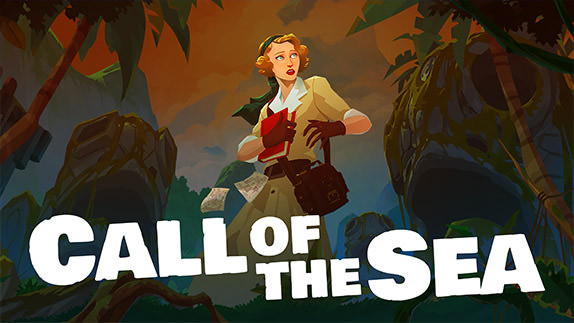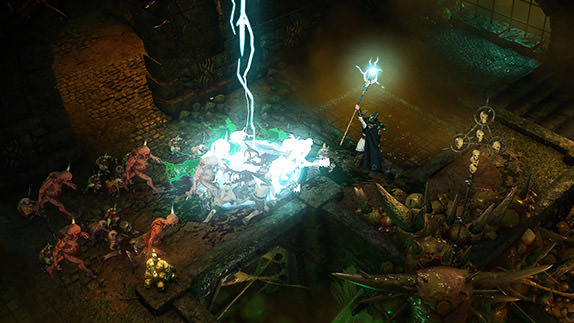Omerta: City of Gangsters Review
 By Kevin Mitchell
Posted on February 5, 2013
By Kevin Mitchell
Posted on February 5, 2013
Trading a communist dictatorship and a sunny tropical island for the sights and sound of prohibition era Atlantic City, Omerta: City of Gangsters isn’t your traditional strategy game – feeling more like a browser based social game, more than anything. As a new wannabe mob boss fresh off the boat, you’ll recruit colorful characters with stereotypical mobster names, such as “Doc” to join your crew, allowing you to occupy various buildings to produce, sell and store illicit goods including: beer, liquor and firearms.
With other businesses and gangsters filling out the map, you would expect to contend with rival mobs encroaching on your territory or even an over zealous bootlegger looking to challenge your presence in his neighborhood. Nothing like this happens in Omerta. The game fails to ever become engaging, allowing you to literally sit back, click a few buttons and watch the money come rolling in without ever feeling pressured or challenged. Unlike Tropico, buildings don’t have any maintenance costs associated with them and your henchmen’s salaries never make a dent into your ever-growing cash flow. It is possible to run out of money if you wastefully spend it on upgrading the hideouts interior rooms, but besides that, I wouldn’t expect to run out of income at anytime.
Since you aren’t in control of the construction of buildings or even given the option of which ones to use, it’s hard to feel a sense of ownership for your crime organization. Having multiple speakeasies or nightclubs close together won’t affect their efficiency and placing the brewery supplying them across town won’t matter one bit.
Muscling out other businesses, going on raids, or even fire bombing buildings are all accomplished by clicking a button and waiting for the results, which always happens to be successful. These choices feel meaningless without the fear of retribution or the chance of failure. The heat mechanic, which should provide a sense of pressure and urgency on your organization can be decreased by a wide plethora of methods, all involving clicking and waiting. Everything you do in the game slowly raises the police’s interest in your operation. Too many illegal actions and they will be knocking on your front door.
Yes, you can get a game over screen if you aren’t able to bribe the police in a last ditch effort, but since all of the illegal activities that raise the heat on your organization earn you money, you will always be able to bribe the police. Rinse and repeat.
With Haemimont Games terrific handling of the Tropico series, I was expecting more with Omerta. The beauty that was Atlantic City during the Prohibition era has been faithfully recreated and it is a thing of beauty, especially when it rains at night. Cars drive around aimlessly, people walk across the boardwalk and streets, yet the world feels sterile. Whether or not you set up a pizzeria to elicit fear within the population in a residential building or what looks like a gas station, it never makes a difference. Icons hovering above the buildings never indicate the exact type of business that operates at the location, forcing you to click on every building you own in order to find the one you are looking for. Right clicking does allow you to see a snap shot of all the businesses that you currently own, but a simple visual cue over the buildings could have gone a long way.
The turn-based combat comes across as simplistic, when compared to recent strategies games such as the highly acclaimed XCOM: Enemy Unknown. Different members of your organization bring different weapons and abilities with them including: pistols, tommy guns, sniper rifles, bats and knives. Melee combatants play an important role by providing devastating status effects that can render enemies or your own gangsters unable to attack or move.
Following in suit to the strategy portion of the game, the combat just doesn’t have much depth. Providing only a limited amount of protection, the cover system doesn’t always make perfect sense. Crates allow you to hide on all four sides, but furniture and various shelving and other structures only provide limited amount of cover. It’s really a moot point considering the AI will for the most part, run out of cover in order to attack.
Venturing through various warehouses, banks, mansions and jailhouses by the end of the game you will be well familiar with every map, as more than likely you will have seen it multiple times over. The voice acting does a more than adequate job at providing quick one-liners from the era, but as with the maps, you will be hearing the same responses over and over. By the end of the time, I ended up turning them off. The jazz music from the era tends to repeat as well, ad while not terrible, it isn’t as memorable as the tracks from Tropico.
If one of the gangsters becomes wounded in combat, you can literally sit around on the city screen and do nothing, while wounds heal without ever worrying about anything negative happening in the process. This essentially removes the need to ever use tactics in the combat portions of the game. You can avoid ever having to experience the turn-based combat by selecting the “auto-resolve” option. It’s percentage based, but if you save and right beforehand, you are able to infinitely reload your save until your gangsters experience success.
The included sandbox mode allows you to use everything from the campaign, but tests your willingness to endure a never-ending map with nothing to challenge you. In Tropico, you still had to contend with the country going bankrupt, getting voted out of office, rival countries and more. Omerta feels like the perfect game to have running in the background when you multitasking and can spare a moment every few minutes to click some buttons.
The multiplayer consists of only the turn-based combat portion of the game; either competitively or cooperatively against AI. Money is earned at the end of a mission allowing you to hire new gangsters or upgrade their weaponry. Leveling up allows you to choose perks for each member of your crew. The cooperative missions provide a decent challenge only because of the sheer amount of enemies that you will be facing. It may be worth the time to play competitively first to level up and earn new weapons before trying to tackle the cooperative missions.
Simply Put:
Without any challenge, the hybrid gameplay from Omerta: City of Gangsters, never won me over. Most of my time was spent waiting in Omerta. Want to raid the nearby brewery? Click on the building and wait for the success screen. Want to shut down a rival speakeasy? Click on the building and wait for the success screen. Just one time, I want the game to tell me I failed or give me control of a situation. There isn’t a sense of consequences for any of the actions you do in the game. The campaign lasts 15-20 hours, but the linear and scripted missions aren’t engaging enough to warrant repeated playthroughs.
Note: Omerta: City of Gangsters was reviewed on PC. A digital copy of the game was provided by the publisher/developer.




